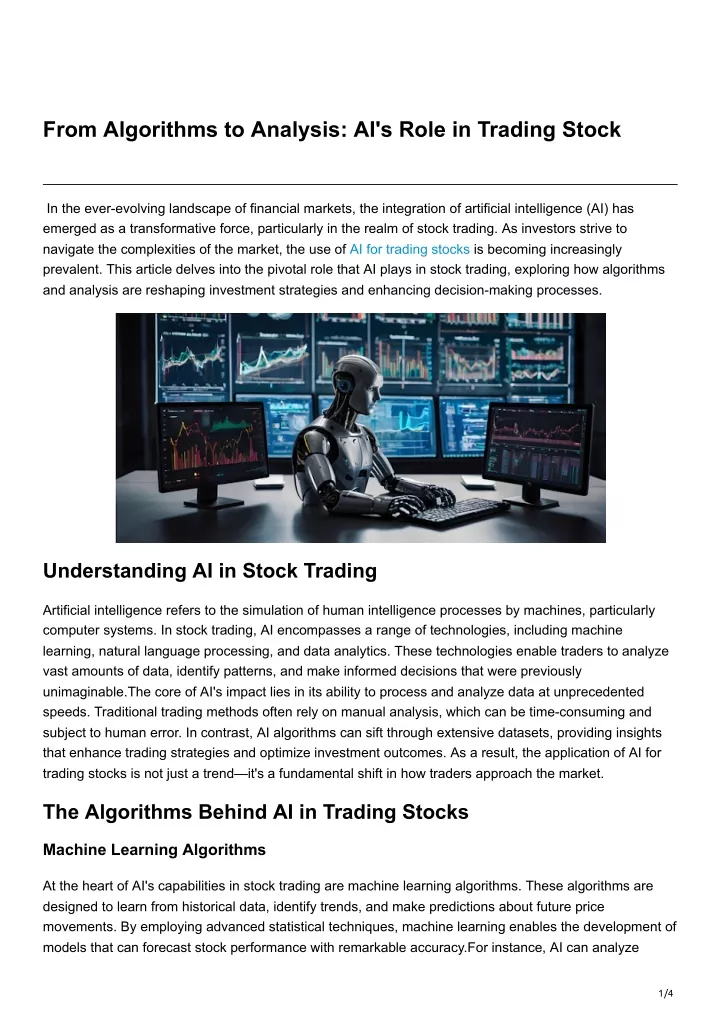20 New Tips On Deciding On AI Stock Predictions Analysis Sites
20 New Tips On Deciding On AI Stock Predictions Analysis Sites
Blog Article
Top 10 Tips To Assess The Accuracy & Performance Of Ai Trading Platforms For Predicting Stocks
It's important to assess the performance and accuracy of AI platforms for stock prediction and trading platforms in order to be sure that you're trusting tools that can provide accurate and reliable information. These are the best 10 ways to assess these platforms.
1. Backtesting Results
What to look out for: See whether the platform provides backtesting in order to see how its predictions would have performed with the past data.
Why It Matters : Backtesting is a method to validate an AI model through comparing the predictions to the results of previous tests.
Tips: Select platforms that let you customize the parameters for backtesting (e.g. time periods or asset types).
2. Real-Time Performance Monitoring
What to look for Check how the platform performs under real-time market conditions.
What's important : The performance of a platform in real time is much better than the backtesting of older versions.
Utilize a free trial or demo account to observe and compare real-time predictions to the actual market movements.
3. Prediction Error Metrics
What to be looking for: To measure the accuracy of your predictions, evaluate measures like mean absolute error (MAE) as well as root mean squared error (RMSE) and R-squared.
Why it's Important: These measures provide a quantifiable measure of how closely predictions match the actual outcomes.
Tip: Platforms who openly reveal these measurements have more transparency.
4. Win Rate and Success ratio
What to Look for: Examine the rate of winning on the platform that is the percent of predictions that are correct. Also, check the success ratio (the profit of trading using predictions).
Why is it important: A high win ratio and success rate indicates better precision in forecasting as well as the possibility of profit.
You should be wary of websites that boast of having a very high winning rate (e.g. 90 %+),) as the system cannot ensure 100% success.
5. Benchmarking using Market Indices
What to look for: Compare the platform's predictions and results to important market indexes, like S&P 500 or NASDAQ.
What is important It can help determine if the platform performs better or less than the overall market.
Find consistency in performance, not just gains over a short period of time.
6. Consistency Across Market Conditions
What to look out for: See how the platform performs during various market conditions.
Why is it Important: A robust system should be successful not only in favorable market conditions but as well in any other circumstance.
Tips: Use the platform during times of volatility or when the market is in a downturn.
7. Transparency in Methodology
What to Look For: Understand the AI algorithms and models that are that are used (e.g., neural networks or reinforcement learning).
Why it Matters Transparency can help you assess the validity and reliability of scientific research.
Avoid websites that employ "black-box" models that do not explain the process of making predictions.
8. User Reviews and Independent Testing
What to Look for When selecting a platform: Read the reviews of users and search for tests that are independent or independent evaluations.
What's important The importance of independent reviews, tests and evaluations offer unbiased and objective information about the accuracy of the platform and its performance.
Review user comments on forums like Reddit copyright and financial blogs.
9. Risk-Adjusted Returns
What to look for: Assess the platform's performance by using risk-adjusted indicators such as the Sharpe Ratio or Sortino Ratio.
Why it Matters: These metrics take into account the amount of risk required to achieve the desired returns. This provides a full analysis of performance.
Sharpe Ratio can be a useful indicator of returns adjusted for risk.
10. Long-term track record
What to look for: Determine the overall performance of the platform over the period of time (e.g. 3 to 5 years).
What is important The long-term track record is a more reliable indicator than short-term results.
Tips: Avoid platforms that demonstrate only the short-term or only selective success.
Bonus Tip: Use a Demo Account to test.
Demo accounts and free trials let you test the platform's predictions in real-time without putting any money on the line. It lets you test the reliability of predictions and their performance.
These tips will help you to evaluate the accuracy and performance of AI platform for predicting stocks. This will enable you to pick one that best suits your trading needs and the risk you are willing to take. It is crucial to keep in mind that there isn't a perfect platform. The best strategy is to mix AI knowledge with your own research. View the most popular ai investment app for site advice including incite, ai for investment, ai trading tools, ai investing, ai stocks, best ai trading app, ai stock trading, ai stock market, ai for investing, ai investing and more.
Top 10 Tips For Evaluating The Regulatory Compliance Of Ai Stock-Predicting/Analyzing Trading Platforms
Compliance with regulatory requirements is an essential aspect to consider when considering AI trading platforms for stock prediction or analysis. Compliance helps to ensure that the platform operates within legal frameworks and protecting the privacy of users. Here are the top ten guidelines for evaluating regulatory compliance.
1. Verify Licensing and Registration
Regulatory bodies: Ensure your platform is registered and licensed by appropriate financial regulatory authorities (e.g., SEC in the U.S., FCA in the UK, ASIC in Australia).
Verify broker partnerships. If the platform integrates brokers, make sure they're licensed and regulated.
Public records: You can check the official website of the regulator to see if the platform is registered and whether there have been any violations in the past.
2. Assessment of the Data Privacy Compliance
GDPR In the event that you are serving or operating within the EU, make sure that your platform is in compliance to the General Data Protection Regulation.
CCPA for Californians Check compliance with California Consumer Privacy Act.
Data handling policy: Ensure you review the platform's privacy policies to learn the way in which user data is gathered and stored.
3. Evaluating Anti-Money Laundering / AML Measures
AML policies - Ensure that the platform's AML policies are effective and effective to detect and prevent money laundering.
KYC Procedures: Verify whether there are procedures on the platform for confirming the identities of its users.
Check the platform's transaction monitoring. Does it monitor transactions and report suspicious activity to authorities?
4. Check for compliance with Trading Regulations
Market manipulation: Make sure that the platform has safeguards to protect against market manipulation like spoofing or wash trading.
Order types. Verify whether your platform is in compliance with the rules for orders.
Best execution: Make sure the platform follows the best execution procedures. This will ensure that trades are carried out at the most competitive price.
5. Cybersecurity Assessment
Data encryption: Ensure the platform has encryption in place to protect your personal information while it is in transit as well as at rest.
Incident response Incident response Verify the platform's plan to respond in case of cyberattacks or data breaches.
Certifications: Determine if the platform has cybersecurity certifications (e.g., ISO 27001, SOC 2).
6. Evaluate Transparency and Transparency
Fee disclosure: Make sure the platform clearly discloses all fees, including extra or hidden charges.
Risk disclosure - Make sure that the platform has clear risks and disclosures. This is particularly important for trading strategies that have high leverage or risk.
Performance reporting: Check whether the AI platform's models are clear and correctly recorded.
7. Make sure you're in compliance with International Regulations
Cross-border trading. If you are planning to do international trading, ensure that your platform adheres to all applicable regulations.
Tax reporting: See whether the platform provides tools or reports that help users to comply with tax regulations.
Conformity with sanctions: Ensure that the platform adheres to the sanctions and will not allow dealings or transactions with countries or entities that are banned.
8. Examine Record-Keeping and Audit Trails
Transaction records: Verify that the platform keeps precise records for purposes of regulatory and for audit.
User activity logs: Verify if the platform logs users' activities, including trading, logins, as well as changes to the account settings.
Audit readiness: Make sure that the platform can provide necessary documentation and logs in case an audit by a regulatory agency.
9. Assess Compliance with AI-specific Regulations
Algorithmic Trading Rules If your broker supports algorithmic trades, make sure it is compliant with the regulations like MiFID II (in Europe) or Reg SCI (in the U.S.).
Fairness and bias Check if the platform mitigates or is monitoring its AI models for ethical and fair trading.
Explainability: In accordance with certain regulations, the AI platform should be able to provide clear explanations for AI-driven decisions and predictions.
10. Review feedback from users and regulatory history
User reviews: Use feedback from users to evaluate the platform's regulatory conformity.
History of regulation: Determine if the platform has any history of regulatory violations and penalties, fines or fines.
Third-party Audits: Ensure that the platform has been subjected to third-party audits to ensure that it is in compliance with all regulations.
Bonus Tips
Legal consultation: You may want to consult an expert in law to assess the platform's compliance with relevant laws.
Trial period. You can use the trial or demo of the platform to test its features for compliance.
Customer Support: Ensure that the platform offers customer support for any questions or problems related to compliance.
With these guidelines you can identify the level of compliance with regulations within AI stock trading platforms. This will enable you to select a platform which is legal and protects your interest. Compliance not only helps to lower legal risks, but also improves confidence with the platform. View the most popular ai for trading stocks hints for blog info including ai stock price prediction, trading ai tool, ai copyright signals, how to use ai for stock trading, chart ai trading, ai investment tools, ai in stock market, best ai trading platform, ai trading tool, ai software stocks and more.